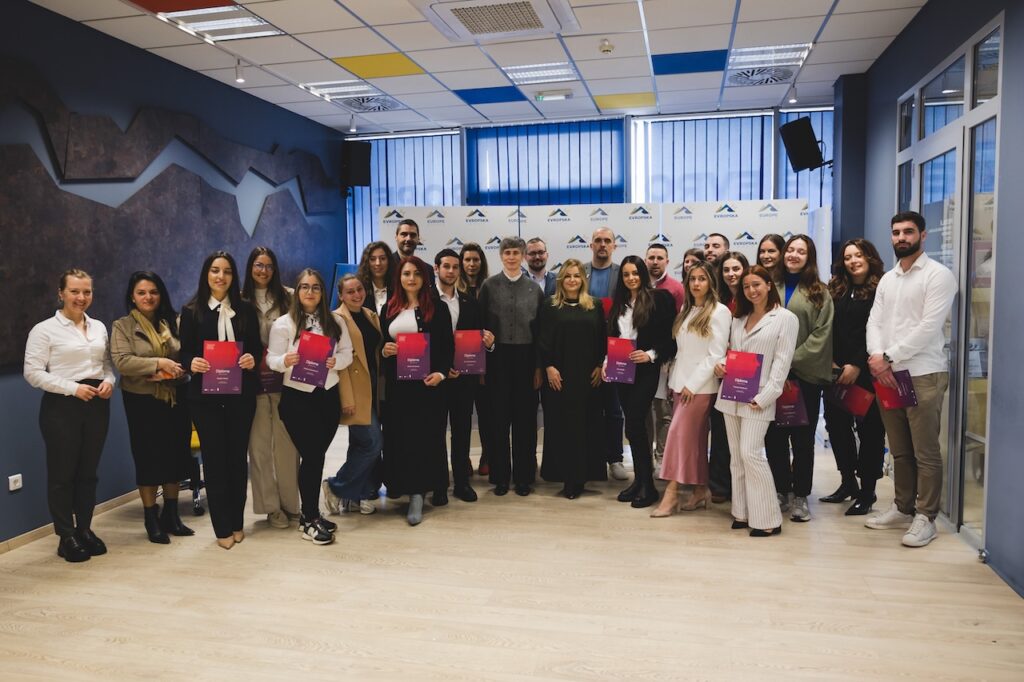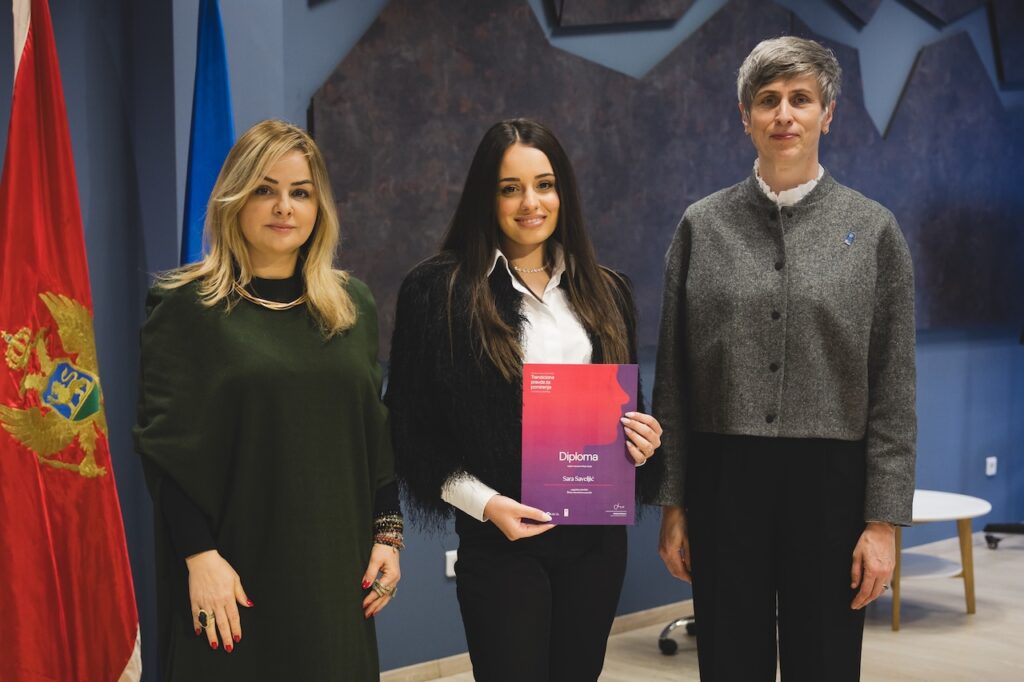Confronting the past is not just a historical lesson – it is our ongoing responsibility in building a functional democratic society. This message marked today’s diploma award ceremony for participants of the Transitional Justice School, organized by the Centre for Civic Education (CCE) and the United Nations Development Programme (UNDP) in Montenegro, within the project Education for the Future – Transitional Justice for Reconciliation. The project is part of the regional initiative EU Support to Confidence Building in the Western Balkans, funded by the EU and implemented by UNDP.
The official ceremony, held at the Europe House, concluded the School’s programme, with diplomas awarded to participants by Ekaterina Paniklova, UNDP Resident Representative in Montenegro, and Daliborka Uljarević, Executive Director of CCE.
From April 12 to 14, 2025, a study visit was organized for the participants, which included visits to sites of crimes committed during the 1990s, as along with discussions with activists from organizations dedicated to studying these war crimes and preserving the memory of the victims.
During the visit to the former Morinj camp, participants had the opportunity to speak with Ervina Dabižinović from NGO ANIMA about the experiences of survivors and the importance of a culture of remembrance. In Herceg Novi, in front of the local police station, Alen Bajrović shared his personal and painful testimony as the son of a victim of the “Deportation” crime. Participants also visited the Obrad Cicmil Bridge in Plužine, where the Klapuh family from Foča was murdered in 1992. At the memorial for the victims of the Štrpci crime, they heard from Demir Ličina, son of a victim and president of the NGO Štrpci – Against Oblivion. Later, in Kaluđerski Laz, another site of suffering, they spoke with Haxhi Lajçi, professor and activist from Rožaje, about the power of facing the past and the importance of justice for all. During this intensive two-day visit, participants not only learned about the crimes but also about the political atmosphere at the time, related court proceedings, and the state’s treatment of victims, witnesses, and perpetrators.
After the memorial site visits, the participants met in Podgorica with the Vice President of the Parliament of Montenegro, Mirsad Nurković, who introduced them to the work and functioning of the institution. “It is a great pleasure to welcome you on behalf of the Parliament and discuss a topic that is extremely important and has marked recent decades,” said Nurković. He highlighted how transitional justice intertwines with Montenegro’s democratic transition, emphasizing the significance of EU integration. Nurković expressed his belief that Montenegro has the capacity, especially among its youth, who he described as “unburdened by the past, reaching out to one another, and capable of building quality interethnic and interfaith relations.” He concluded that Montenegro has no alternative to a civic society and EU integration.
At today’s diploma ceremony, UNDP Resident Representative Ekaterina Paniklova noted that traditional education systems often do not offer enough practical tools for building a culture of remembrance and confronting the past. This is precisely why non-formal education plays an important role in creating spaces for dialogue, shared learning, and understanding different perspectives. “The conclusion of another module of the Transitional Justice School represents an important milestone – both for this project and for the broader regional initiative we are implementing with EU support. It is a step forward toward building an informed and engaged society that we all strive for Montenegro to become”, she stated.
“By supporting initiatives like this one, we continue to show that facing difficult truths, encouraging dialogue, and empowering young people are essential steps toward lasting peace and reconciliation. Their commitment sends a clear message: confronting the past is not just a regional priority, but also a European value”, Paniklova added, thanking the EU for recognizing UNDP as a valuable partner in this joint effort.
“At CCE, we believe that it is necessary to learn the facts and address topics that, unfortunately, are rarely or insufficiently covered in the formal education system, making them vulnerable to manipulation that affects our daily lives.Learning about the painful parts of our past fosters critical thinking about the present and the role of various actors, as well as paths to action – and that is a way to responsibly shape our future”, stated Daliborka Uljarević, CCE’s Executive Director.
“Stay curious and critical, do not accept oblivion, choose knowledge over prejudice, facts over manipulation, and reasoned dialogue over populist labeling or violence. Let these diplomas serve as a reminder of the support you received to change our society for the better – by bringing more justice, empathy, and above all, accountability”, she said while presenting the diplomas.
Programme participant Jovan Joksimović underlined the importance of education about past crimes through concrete and direct approaches. “The Transitional Justice School helped me expand my knowledge of war crimes committed in Montenegro during the 1990s. Through lectures, study visits to crime scenes and relevant institutions, I gained insight into the complex circumstances that preceded these events. It is crucial for young people to be informed about transitional justice and dealing with the past, and programmes like this contribute to that. I hope there will be more of them in the future”, said Joksimović.
Savo Knežević also described the School as a powerful and inspiring experience. “I had the opportunity to visit significant memorial sites and hear deeply moving testimonies survivors of war crimes, such as Alen Bajrović in Herceg Novi and Demir Ličina in Bijelo Polje. These stories left a strong impression on me and strengthened my belief in the importance of confronting the past. I especially value the chance to connect with young people who share the same values and with whom I exchanged ideas and emotions. I am grateful for this experience, which motivates us to build a society based on truth and justice”, Knežević concluded.
The previous module included a series of lectures and debates with human rights activists, academic and professional experts, historians, psychologists, filmmakers, and musicians.
Maja Marinović, Program Associate




